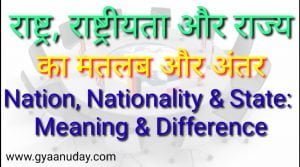What is Positive and Negative Liberty
In the realm of political science, the concepts of negative and positive liberty are often discussed to analyze the relationship between individuals and the state.
Negative Liberty
Negative liberty refers to the absence of external constraints or interference on an individual’s actions, allowing them to exercise their freedom without hindrance. It emphasizes non-interference by others, particularly the government, in an individual’s pursuit of their own interests and goals. While negative liberty emphasizes limited state intervention as a means to protect individual liberties from undue restrictions.
Positive Liberty
On the other hand, positive liberty focuses on enabling individuals to have the capacity and resources necessary to exercise their freedom effectively. It recognizes that true freedom goes beyond mere absence of constraints; it involves empowering individuals with opportunities and resources to make autonomous choices. Positive liberty highlights the role of government in ensuring social justice, equal access to education, healthcare, employment opportunities, and other essential services.
Read also : What is Political Science and its Requirement in Present Time
Positive liberty argues for active state intervention as a means to enhance individual freedoms by addressing systemic inequalities. These contrasting perspectives on liberty have profound implications for political ideologies and policy debates surrounding issues such as welfare provision, economic inequality, civil rights protections, and social justice.
Understanding these differences is crucial for comprehending various political theories and formulating effective governance strategies that balance individual freedoms with societal well-being.
The Distinctive Features Of Negative Liberty
The concept of negative liberty, often referred to as the absence of interference, plays a crucial role in political science. Negative liberty emphasizes the freedom from external constraints or barriers that limit an individual’s ability to act as they choose.
One distinctive feature of negative liberty is its focus on non-interference. In this context, non-interference refers to the absence of external influences that impede an individual’s autonomy. It underscores the belief that individuals should be free from coercive forces such as laws, regulations, or social pressures that restrict their choices and actions. Negative liberty champions the idea that individuals should have the right to pursue their own goals and desires without undue interference from others or the state.
Read Also :: Scope and Objectives of Political Science
Moreover, negative liberty places emphasis on protecting individual rights and liberties. It acknowledges that every person possesses inherent rights which must be safeguarded against arbitrary encroachments. These rights include freedom of speech, religion, association, and privacy among others. Negative liberty recognizes that these fundamental rights are essential for individuals to live autonomous lives and make choices according to their own values and preferences.
Overall, the distinctive features of negative liberty revolve around non-interference and protecting individual rights against external constraints or interferences. It provides a framework within political science for evaluating and promoting personal freedoms in society.
Understanding Positive Liberty: A Counterpoint To Negative Liberty
In the realm of political science, the concept of liberty is often divided into two distinct categories: negative liberty and positive liberty. While negative liberty emphasizes freedom from external constraints and interference, positive liberty offers a different perspective by focusing on the individual’s capacity to actively pursue their own goals and aspirations.
Positive liberty recognizes that true freedom is not merely the absence of obstacles, but also the presence of opportunities for self-realization. It asserts that individuals should not only be free from coercion but also have the necessary resources and capabilities to exercise their agency. This notion implies that society has a responsibility to ensure equal access to education, healthcare, employment opportunities, and other means necessary for individuals’ self-development.
Unlike negative liberty, which primarily concerns itself with limiting external interference, positive liberty places an emphasis on empowering individuals to fulfill their potential. It suggests that true freedom can only be achieved when individuals are equipped with the tools they need to shape their lives according to their own values and desires. While negative liberty guards against excessive state control or interference in personal affairs, positive liberty invites a more proactive role for government in promoting social justice and equality. By recognizing both dimensions of liberty – negative and positive – political science offers a more comprehensive understanding of freedom’s multifaceted nature.
Please share this post with your friends and students to understand Difference in Negative and Positive Liberty.



